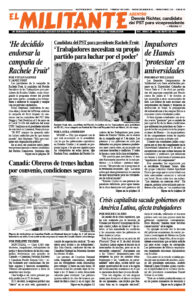After a yearlong dispute, Democrats and Republicans reached a bipartisan agreement April 20 to renew and expand secret spy powers contained in the Foreign Intelligence Surveillance Act. In the process, they advanced steps to try to refurbish the reputation of the FBI, the capitalist rulers’ political police.
The law lets the government snoop on any non-U.S. citizen living abroad and any U.S. citizens that these noncitizens email, text or call without needing to get a warrant.
To reach the agreement, amendments were added that supposedly curtail the spy agencies’ powers, including limits on the number of agents who can use the FBI’s database and a threat of harsher penalties for snoops who don’t comply with FBI “guidelines.” Between 2020 and early 2021, the FBI admitted it had “improperly” abused its procedures 278,000 times.
This included spying on people at protests against police brutality after the death of George Floyd; on participants in the Jan. 6, 2021, melee at the Capitol; and on some 19,000 donors to political campaigns.
FISA will come up for renewal again in two years, instead of five. And from now on, the FBI must let Congress know if it puts any of its august members under surveillance. Of course no notification is needed to spy on the rest of us.
Supporters of the bill’s renewal touted these changes. House Speaker Michael Johnson claimed they “would actually kill the abuses that allowed President Trump’s campaign to be spied on.” In 2016 the FBI got a FISA court to ratify its spying on Trump campaign worker Carter Page based on Democrats’ claims Trump was colluding with Moscow.
Amendments were also adopted that increased the reach of the FBI, allowing it to spy on U.S. citizens who happen to mention the name of someone the FBI is targeting abroad. The new statute expands the range of businesses that must provide government spies with information they collect on individuals. It replaces reference to “electronic communication service provider,” with the more wide-ranging “any other service provider.”
No capitalist state can maintain the ruling class’s domination without spying on its opponents at home and abroad, especially working-class parties and political groups. The U.S. rulers are no exception. Since 1939 the FBI has been tasked with this, trampling on free speech and other constitutional protections.
Rulers move to refurbish FBI’s image
In the course of the struggles against Jim Crow segregation and the Vietnam War, the rulers’ spy agencies were exposed and discredited in the 1960s and ’70s. During the Socialist Workers Party’s historic 1973 lawsuit against the FBI, decades of break-ins, wiretaps, disruption and the use of informers were uncovered, targeting unionists, Black rights fighters, communists and opponents of Washington’s wars.
Ever since, the rulers have worked overtime trying to burnish the FBI’s image. Five years after the SWP’s lawsuit began, the Foreign Intelligence Surveillance Act was adopted, supposedly to limit FBI snooping. In fact it set up a procedure for approving warrants to spy on U.S. citizens in secret hearings at FISA courts, where the FBI and other agencies don’t have to provide any sworn testimony to get permits. From the outset, these courts have been integral to FBI frame-up operations, approving some 99% of all requests.
In 1986, the federal court in New York ruled the revolutionary views of the SWP were constitutionally protected and that the FBI could not infiltrate it or spy on its members; that its burglaries and wiretapping of the SWP were unconstitutional; and that its attempts to disrupt the party’s activity was illegal. That victory was a gain for all working people.
The government continued to seek openings to expand its spy operations, adopting the Patriot Act in 2001, after al-Qaeda’s 9/11 attacks. In a blatant violation of free speech, the act allowed courts to grant surveillance orders based on a person’s internet searches, book purchases and published writings. Searches could be conducted without the government having to show that individual is likely to commit a crime. Nor does the person targeted ever have to be informed of the search, opening the door to the government being able to use secret evidence in a trial.

